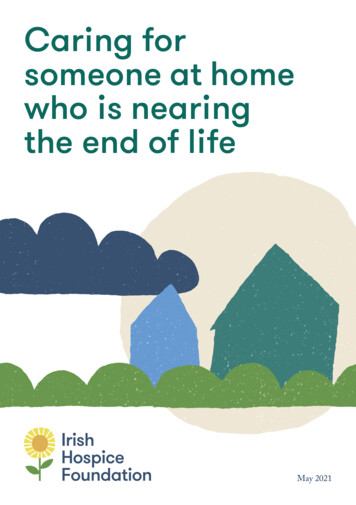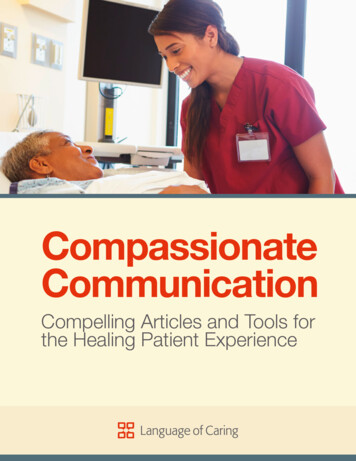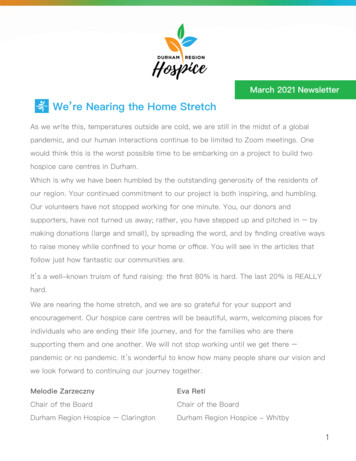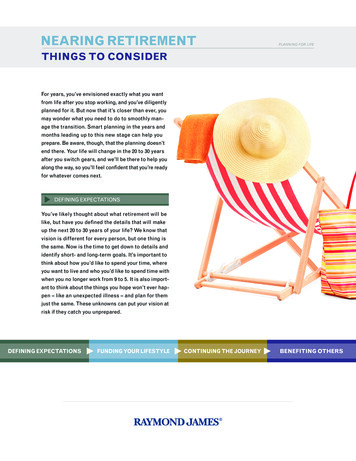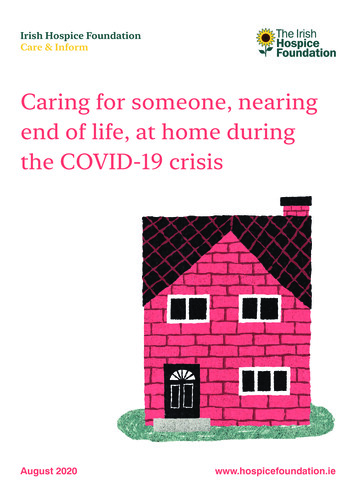
Transcription
Irish Hospice FoundationCare & InformCaring for someone, nearingend of life, at home duringthe COVID-19 crisisAugust 2020www.hospicefoundation.ie
Irish Hospice FoundationCare & InformIf someone you know is living with a terminal illness, you may be worried about manythings, including COVID-19. People living with a terminal illness are at higher risk ofexperiencing more serious complications from COVID-19. This is an emotional andchallenging time for everybody.We have adapted the information here from what is available from theHealth Service Executive (HSE) and Hospice Friendly Hospitals Programme(HFH). We have also consulted with; clinicians; the Irish College of GeneralPractitioners (ICGP); Care Alliance Ireland and the All Ireland Instituteof Hospice and Palliative Care Voices4Care group to ensure that thisinformation is accurate and reliable. Much of the information has beenadapted from the booklet: When someone you care about is dying inhospital – What to expect. This booklet contains information about thephysical changes that happen as a person is dying. It can be accessed e-about-is-dying-in-hospital/When someone you careabout is dying in hospital- What to expect -1Talk to a healthcare professional, such as your GP, Public Health Nurse or CommunitySocial Worker, if there is anything worrying you or the person you are caring for. Youmight be concerned that now is not a good time to do this. However, services are stilloperating, and GPs can be contacted by phone. Tips on staying in contact with yourGP and other community-based healthcare professionals are provided below. This isfollowed by practical information about providing end-of-life care at home. We alsoprovide answers to some questions about caring for someone at the end of life duringthe COVID-19 crisis.Staying connected with your GP and community-based healthcareprofessionals during COVID-19It’s important to stay connected to the healthcare professionals who can support you.This list may help: Have you contacted your GP, Public Health Nurse and/or the local CommunitySpecialist Palliative Care team? Have you let your GP know what’s happening, and what support you need? YourGP can provide advice on managing pain and other common symptoms at endof life. Do you know the best hours to contact your GP? It is best to contact themearlier in the day rather than later as contact hours may be reduced because ofCOVID-19. Do you know how to contact the GP Out of Hours service (if contacting with aNon COVID-19 problem)? Try to contact your own GP earlier if possible. Remember if an emergency occurs, dial 112.
Irish Hospice FoundationCare & Inform Have you contacted your pharmacist about the medications you will need athome? Ask about home deliveries too. Have you asked the Public Health Nurse or Community Specialist Palliative CareTeam about getting other supplies and equipment that you may need, such asincontinence wear? Consider asking your GP to send you any relevant information to keep in thehome. This may include a list of medications, Summary Medical History, and aCare Plan.How can I get Specialist Palliative Care services at home?Your GP and Public Health Nurse are your most important healthcare resources.They will continue to provide care and support during COVID-19.Your local Community Specialist Palliative Care Team can offer advice about end-oflife care. Your GP or Public Health Nurse can put you in touch with them, after theyhave talked with the person living with the illness and/or their carer(s).Supporting the person who is dying at homeOther supports available to help people who are nearing end of life at home includethe Irish Cancer Society’s free Night Nursing service (for people dying at home withcancer) and the Irish Hospice Foundation’s (IHF) free Nurses for Night Care service (forpeople dying at home with illnesses other than cancer).Information about the Nurses for Night Care and Night Nursing services are availablevia the links below: Irish Hospice Foundation Nurses for Night Care -for-night-care/ Irish Cancer Society Night Nursing fects/palliative-careThis information from the Irish Cancer Society might also be useful to refer to whencaring for someone at the end of life at home: lliative-careThe HSE has issued practical advice and information for carers providingpalliative care. It is available at: les/24032020%20Practical%20care%20for%20carers.pdf
Irish Hospice FoundationCare & InformBeing with a person who is dying at home: If you are well yourself, it is good to sit in the room with the person and continueto speak to them, and to have conversations if they are interested. Sitting with the person and listening is very important. Careful listeninghelps the person who is dying to share their feelings. It may also help you tounderstand their concerns. Be respectful of what the person says. Try not to brush them off or change thetopic. Most people just want to be listened to as they express their hopes and fears.They may also just want to know that they are not alone. If they can respond, provide the person with a phone, ipad or tablet to allowthem to stay connected. Even if they can’t respond, they may enjoy being able tosee or hear people who contact them. Some people might need to be transferred to hospital at the end-of-life. This canbe upsetting but could also be the right thing for everyone.What to expect if someone is dying at homeCaring for a dying person at home is very rewarding, but it can also be very hard. Thefollowing points may be helpful to consider as a person is dying: When close to dying, many people stop wanting to eat or drink, their lips and throatcan sometimes get dry. This is normal, but it can be upsetting for those who careabout them. You can help them by gently wetting their mouth and lips. Applying alip balm can also help. This will usually be enough to keep the person comfortable. Sometimes the person who is dying can become restless. They may be anxious,or make repeated movements, such as pulling at their blankets or clothes. Thisis usually because of physical changes in the body.
Irish Hospice FoundationCare & Inform The person’s hands and feet may feel cold and may change colour. This isbecause their heart is sending blood to the vital parts of the body, and it is notreaching their arms and legs. You can put extra blankets over the person’s handsand feet to keep them warm and comfortable. They may spend more time sleeping. When they are awake, they may be tiredand sleepy, with little energy. They may not want to speak. They may slip in andout of consciousness. This is normal. As they become evidently weaker and tired, it is a good idea to limit and reducevisiting.(HSE & IHF, 2018 When someone you care about is dying in hospital – What to Expect)Specific considerations for visitors during COVID-19National rules about visiting during COVID-19 are there to protect everyone fromgetting the virus. The rules change often so be sure to keep up to date with guidelinesavailable from the HSE. See: /#essential-servicesIf people do visit: Visits should be kept as short as possible. Maintain the 2 metre (6ft) rule for social distancing as best you can. Make sure that everyone visiting the house washes their hands carefully whenthey arrive and when they leave. If possible, have soap and towels specially for visitors. People who have any illness, or who are feeling unwell, should not visit.What can I do if I can’t visit someone?Current HSE advice is that everyone should socially distance themselves. Make surethat everyone who wants to visit understands this. Remember: Although upsetting, not being able to visit is not your fault. It is the best way toreduce the risk of others getting COVID-19. You may be able to text, phone, video call or keep in touch via social media.Writing a thoughtful letter or card is also a good way to let someone know thatyou’re thinking of them. Assisting with caring tasks such as grocery shopping or cooking meals can be agood way to stay involved, even if you can’t visit in person. Ask the person andthose close to them what would help them most.
Irish Hospice FoundationCare & InformCaring for yourselfCaring can be lonely at any time, but might be especially lonely now, during COVID-19.Worrying about what will happen is normal and can also be very upsetting and tiring. It isimportant to stay in touch with other people and ask them to help you. Even if people cannot visit you, allow them to offer their support in different ways.Texts, emails and messages through social media, phone and video calls are allgreat ways to stay in touch. Remember to eat and to keep hydrated. Your body has needs, and caring is hardwork. It’s OK to feel overwhelmed, as well as to have feelings of loss even before theperson has died. Reach out to people for support; share your feelings if you are able. Plan for the eventuality that your family and friends can’t visit. Think about whocan help with day-to-day caring duties, as well as how you can stay in touch. Keep conversations going with the people who are closest to you, like your familyand friends. Even if those closest to you are not physically near, contact them and ifpossible, talk with someone each day. Having conversations keeps communicationflowing and can remind you that people are thinking about you. If you get offers of help, allow yourself to accept them where you can. Be open tosuggesting to people ways they can best help you. Remember, people do want tohelp you. Keeping some routine, like mealtimes, can be helpful. Having a fixed bedtime andgetting-up time is good too. Try to stick to your normal routine as much as possible.Try getting outside too, if possible. If there are children in your family, check in with them. Answer their questionshonestly. Don’t dismiss them. Children may appear sad and happy in the space ofminutes. Try to limit how much news and social media you consume, particularly beforebedtime. When you are feeling very sad, news reports can be distressing.Planning aheadIt is important to think and talk about end of life. Opening a conversation about aperson’s values and wants can help them to maintain control over their end-of-lifecare.Simple conversation openers include: ‘If you were to become very unwell and unable to speak for yourself, is thereanything you’d like me to know about your wishes and preferences?’
Irish Hospice FoundationCare & Inform ‘Is it OK to write some of this down so I don’t forget?’ ‘Is there anything that you don’t want to happen at the end?’ ‘Is there anything you would like to happen?’ ‘Is there something I should know that I don’t know?’Don’t rush this process. Take your time and talk it through a little bit at a time, if thatseems best. Consider doing it a second time if you feel it may be useful to do so.Some people may not want to talk about their dying or their death. This is OK. Let themknow that you understand that it is not easy and maybe they will want to talk about it later.The IHF ‘Think Ahead’ form aims to help people to think about end-of-life preferences,talk about them openly, and write them down. You can fill in as much or as little of theform as you like. It really depends on how much information you want to share andwhat is important to you.‘Think Ahead’ contains an advance healthcare directive which sets out:1. Your wishes in relation to refusing treatmentif you are unable to speak for yourself.2. Who you want to speak for you (a trustedperson) if you cannot speak for yourself.‘Think Ahead’ is available to download from:www.hospicefoundation.ie/thinkahead.Specific answers to COVID-19 questionsWhat is COVID-19 and where can I access reliable information about it?COVID-19 is an illness that can affect your lungs and airways. It is caused by a viruscalled coronavirus.It’s important to access reliable and trustworthy information in relation to COVID-19.The Health Service Executive (HSE) has lots of practical and useful information inrelation to COVID-19. See: www2.hse.ie/coronavirus/Will the Community Specialist Palliative Care Team still come to my home?Yes. HSE community services, including the service provided by the CommunitySpecialist Palliative Care Team, are still working and available during COVID-19. Yourlocal hospice can provide you with information.The Irish Hospice Foundation is also here to support you with information if you arecaring for someone at home who is nearing end of life. Our phone number is: (01)6793188 or email: info@hospicefoundation.ie
Irish Hospice FoundationCare & InformIf I get COVID-19 will my ‘Think Ahead’ form be valid?Yes. The advance healthcare directive part of ‘Think Ahead’ is valid and legally bindingif you have: Filled in the advance healthcare directive (Part 2.2) Had it signed and witnessed by two people over 18 (at least one of whom shouldnot be a family member).It is vital that you tell people you trust, such as your family, close friends and/ordoctors, that you have made an advance healthcare directive.It is also important to remember that what’s written in your advance healthcaredirective will only apply if you lose capacity and are unable to speak for yourself.I’m the main carer for a person who is dying at home. What should I do if I think Ihave COVID-19?If you think you have COVID-19, follow the advice provided by the HSE here: www2.hse.ie/conditions/coronavirus/testing.htmlYou can contact your GP by phone for information and advice.Where can I get other useful advice on caring for a person with COVID-19?The HSE has lots of useful information about caring for someone with COVID-19,including a list of do’s and don’ts and information about living with other people. ion-and-limited-social-interaction.htmlFamily Carers Ireland also offers some useful advice for carers. See: on-advice/This leaflet is brought to you by The Irish HospiceFoundation. If you would like to support us you can doso online at www.hospicefoundation.ie
Other supports available to help people who are nearing end of life at home include the Irish Cancer Society’s free Night Nursing service (for people dying at home with cancer) and the Irish Hospice Foundation’s (IHF) free Nurses for Night Care service (for people dying at
